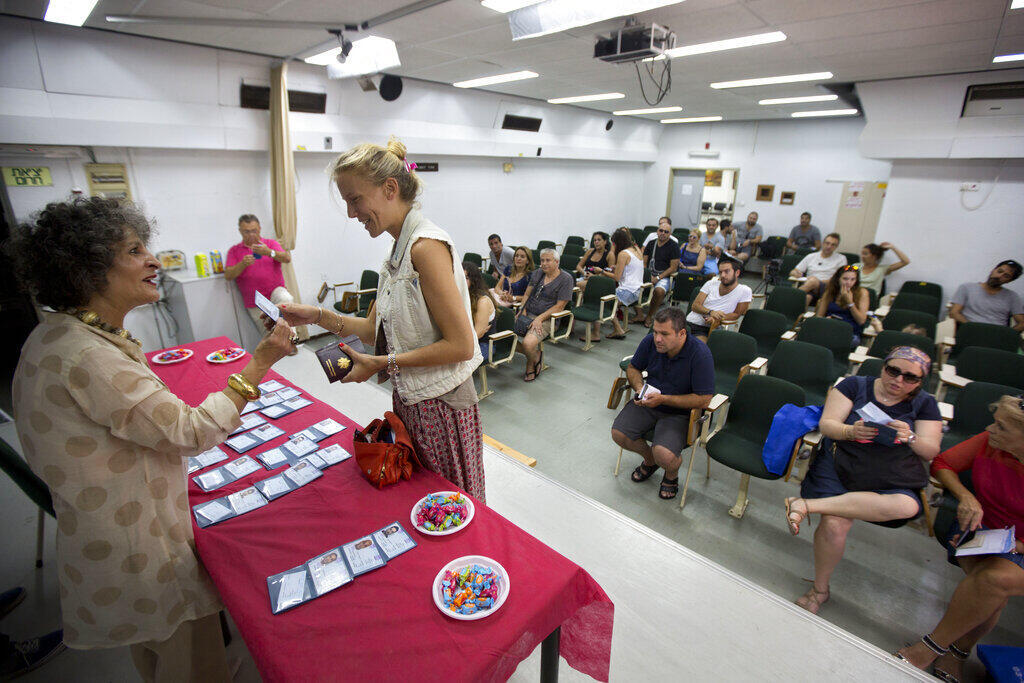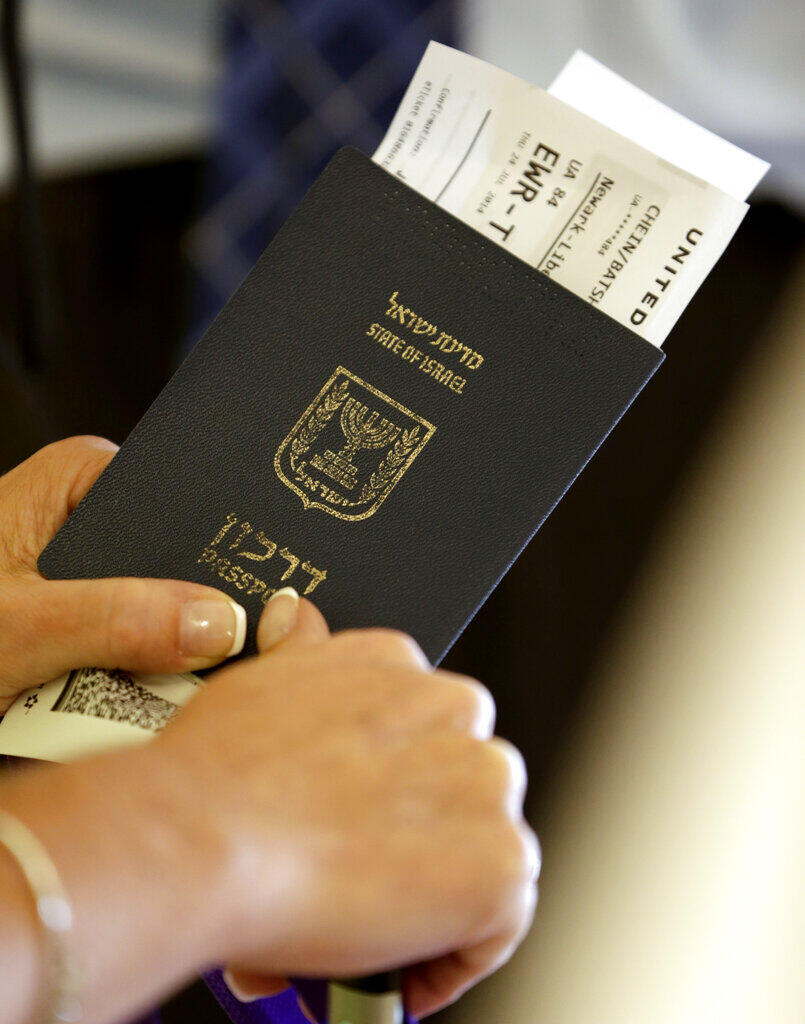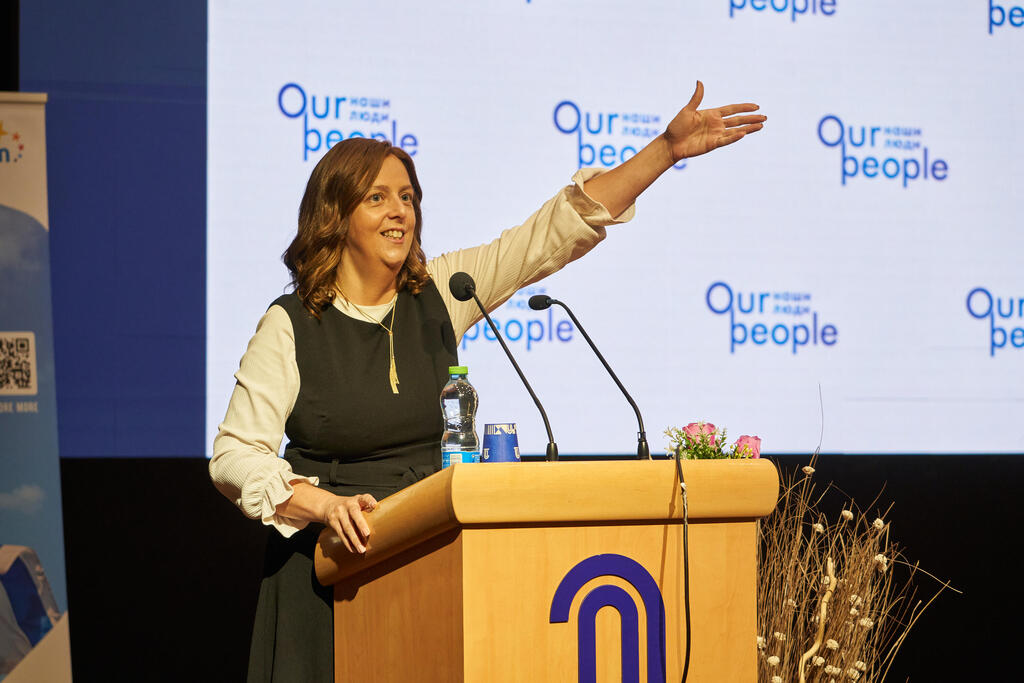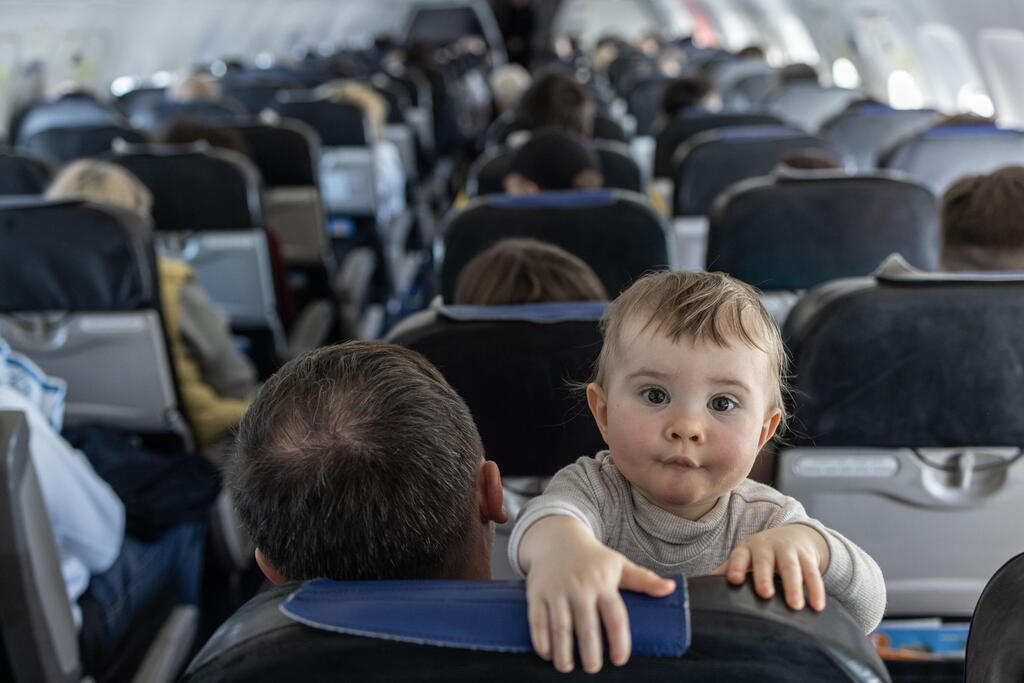Does the Law of Return, enacted in 1950, still suit the global reality of 2023? This discussion carries immense implications for the Jewish identity of the State of Israel and its connection to the Jewish Diaspora and scattered descendants of Jews worldwide, making it one of the most divisive issues in the Jewish world.
Read more:
Any change in the wording of the law will potentially add or subtract from the lists of potential new immigrants and will directly affect millions of people worldwide.
6 View gallery


New immigrantd receive their new Israeli ID cards at Ben Gurion Airport
(צילום: Sebastian Scheiner, AP)
In this context, the grandchild clause is the most contentious issue. Currently, the law grants the right to citizenship in Israel to the children and grandchildren of Jews. Over the years, descendants of the "third generation" and some even argue for the "fourth generation" of Jews have indeed made Aliyah (immigrated to Israel), though not in significant numbers.
Following the conflict in Ukraine, many beneficiaries of the Law of Return decided to flee the war-torn country, and Israel became the most available haven for them. Later, immigrants from Russia, where the war's impact on civilians became critical, also joined in significant numbers.
According to data from the Knesset Research and Information Center in 2022, there were 62,295 immigrants to Israel from former Soviet Union countries, compared to only 12,873 immigrants in 2021. Russia, Ukraine and Belarus constituted approximately 97% of all immigrants in the years 2022-2023.
The more relevant point in the context of the discussion on the Law of Return is that many of these immigrants are not recognized as Jewish according to religious law, yet they are eligible under the Law of Return.
Leah Aharoni, director of the Our People Association, which assists immigrants from the former Soviet Union countries, said in an interview with Ynet that what needs to be of greater concern is the phenomenon of "passport takers" – new immigrants, both Jewish and non-Jewish, who arrive in Israel, receive Israeli citizenship and immediately move on to the next destination.
Do you have a practical solution to propose against "passport takers"?
"We need to create a mechanism similar to the Green Card in the United States. The eligibility for passports should only come after a certain period during which you live in the country, study Hebrew, start working or studying and show a willingness to settle in Israel. Only then should you be able to apply for a passport and full citizenship. We also need to address the issue of family members of Law of Return beneficiaries. In the current situation, spouses and children, who are often not Jewish, are eligible for citizenship quite quickly, and I believe the country should consider a gradual mechanism so that they can demonstrate seriousness and connection to Israel."
'There is a loophole, and they exploit the system'
Over the past year, "the grandchild clause" has re-emerged in public discussion, but no dramatic changes have been registered at the moment. According to Aharoni, "given the current situation in the country, it is not at the center of discussions, but regardless of amending such a law or not, there is a need to change Israel's immigration policy. We see a phenomenon, growing stronger, of Law of Return beneficiaries who come to Israel, stay here for a short period, and then move on. This happens mainly due to the war between Russia and Ukraine, which led many who never considered coming to Israel, to try to leave the war zone and continue to another destination."
So, what's the solution? These people are not breaking the law, and they are allowed to come to Israel.
"At present, in the current situation of the Law of Return, you are correct - they are allowed to immigrate to Israel as grandchildren of Jews. On the other hand, it's essential to remember that the Law of Return was written in a completely different era, and after decades, it's time to revise Israel's immigration policy. We don't necessarily need to amend the law, but perhaps make some amendments or temporary provisions to establish an effective immigration policy for Israel.
It's time to make changes so that people with no connection to Judaism or no intention to settle in Israel don't exploit this loophole to come here and take advantage of the system. We see a clear trend, since the beginning of the war, where the percentage of non-Jews who immigrate to Israel and don't settle here is more than three times higher than the percentage of Jews leaving in the Jewish Diaspora."
70% Non-Jews according to Halacha
Research conducted by the Knesset and the Central Bureau of Statistics indicates that approximately 70% of recent immigrants are Law of Return beneficiaries but not Jewish according to Halacha (Jewish religious law).
Furthermore, it shows that some of them don't intend to settle in the country and continue on to other destinations after arriving in Israel, either planned from the outset or due to difficulties adjusting to life in Israel.
Since the beginning of the war, around 80,000 immigrants have arrived from Russia and Ukraine. Even if we assume that 70% of them are non-Jews, this data should concern the country and may impact its Jewish identity.
"I think so. First of all, these numbers are not so low, and they may increase as the war continues, and its end is not yet in sight. Second, the situation that has arisen shows us the loophole in the law: there are around 10 million Law of Return beneficiaries worldwide who are not Jews, and their immigration is growing exponentially in each generation.
Just as no one expected this war in Ukraine, no one knows what will happen geopolitically in the world in the coming years. This is a loophole that we must consider and formulate a clear policy for. In theory, we may reach a situation where a large portion of these beneficiaries will want to come to the land, and then there will indeed be a danger to the majority of Jews in Israel."
Are there any non-Jewish immigrants interested in converting and staying in the country?
"Most of them do not really understand the need for conversion. We conducted research about a year ago, and we saw that approximately 15% of them expressed an interest in undergoing the conversion process in Israel. Most of them arrive, settle here and lead regular lives like any other Israelis. Until they reach the subject of marriage, they don't see any need for conversion."
How accessible is the conversion process for them?
"The conversion system is open to those who want to use it. It is free of charge, but of course, it requires effort and investment. In the tradition of Israel, conversion is only for those who truly, truly want it, and those who invest the effort can go through the process."
An Israeli passport offers more opportunities
The issue of the number of departures after a short period is a matter of concern for the Aliyah Ministry, as significant funds are invested in efforts to absorb immigrants.
According to Aharoni, “today, a Russian passport is not desirable in most countries around the world. There are countries that do not even allow you to do a stopover with this passport. An Israeli passport offers many more options, and people continue to other countries like the USA, Canada, and various European countries.
This is a worrying phenomenon, and we are pleased that the state put an end to it in the short term with the Passport Law, which does not allow people to come and take a passport and leave within a month. Today, after the amendment, the immigrant receives an interim certificate, and they must reside in the country for most of the time in the first year to obtain an Israeli passport.”
Where do you see the main impact of this phenomenon?
"This phenomenon of people coming and not wanting to reside here affects Aliyah. First of all, the queue in Russia today to receive an Aliyah visa takes almost a year. This happens because the queue is full of people who want to leave Russia but do not really want to settle in Israel, and they hinder the treatment and quality of the process for those who genuinely want to immigrate.
Even after their arrival, they burden the integration system in the country, and they disrupt those who are genuinely trying to settle and live in Israel. If there is another wave of immigration, the system will not withstand the load, and it will harm Jews who genuinely want to immigrate to the country."
What is the current situation in Russia and Ukraine? Are immigration options still open freely?
"Since the attempted coup in Russia a few weeks ago, it has become even more challenging. Flight prices are extremely high, and leaving the country has become very difficult economically. Russian men also know that at any given moment, they can receive a military draft order, and it is well-known that the average life expectancy of a Russian soldier in Ukraine is not high.
Many fear receiving the draft order and try to leave the country. It is somewhat easier to leave Ukraine, and there is a trickle of several hundred immigrants every month. The situation there is quite difficult, with many cities under ongoing combat.
What is your prediction for the near future – will we see more and more waves of immigration?
"The war is likely not going to end soon, and the attempted coup we saw in Russia will only exacerbate the situation, and we may witness more unstable conditions. All of this, along with the deteriorating economic situation, will push more and more people to try to leave Russia. Israel must prepare for this in all aspects."
Do you receive a sympathetic ear from the government on this issue? After all, this is a government that espouses Jewish identity and right-wing policies, right?
"The data on the percentage of Jews and the number of leavers was prepared by the Knesset Research Institute, and we presented it in discussions with many politicians and in the Knesset. They are heavily focused on judicial reform, and it doesn't seem like they are available to address the Law of Return.
There is a different reality here, and regulations need to be adjusted according to what we see on the ground. No one expected that Jews would want to immigrate to Israel in such large numbers, especially descendants of Jews, but that is the reality, and we must deeply consider it.
On the other hand, non-Jews can argue, rightfully so, that everything is legal, and Israel itself enacted the Law of Return in this form, so they have the right to immigrate and receive the resources allocated to immigrants.
"Of course, they are correct, and there are those who genuinely want to stay here, and they are entitled to full rights according to the current law. However, I want us to combat those who exploit the system and only seek an Israeli passport to move on, and they contribute to the significant numbers of emigrants."
‘We went through it, now it's your turn’
Those who arrived before them and have already integrated into Israeli society understand their difficulties, but they don't always lend a helping hand. "There are organizations that provide assistance, and of course, family and friends are there to support, but it's important to remember that the Israeli mentality is very different from the Russian, and the job market looks different as well.
Many immigrants come from industries that don't exist in Israel or worked in positions that don't have many equivalents here. Some of the older immigrants do indeed help and support, but there are those who haven't forgotten the hardships they went through, and they say to the newcomers – 'We went through it, now it's your turn.'"
One of the jokes among the veteran immigrants is to refer to this immigration as the "pumpkin latte" which came about after a post by a new immigrant complaining that she can't find her favorite pumpkin latte drink in Israel, and she's finding it challenging to live without it. The post went viral and became a social media meme.
Aharoni says, "It's a joke, but it reflects somewhat the attitude of the immigrants in this wave. Veteran immigrants who call it that think about the real difficulties they went through, and here comes a young immigrant whose problem is the lack of her favorite drink. It's a different kind of immigration, more pampered and used to a good life. On the other hand, staying in a war zone is undoubtedly worse, so even though it's not an easy transition, they still come here."
First published: 08:57, 07.21.23







